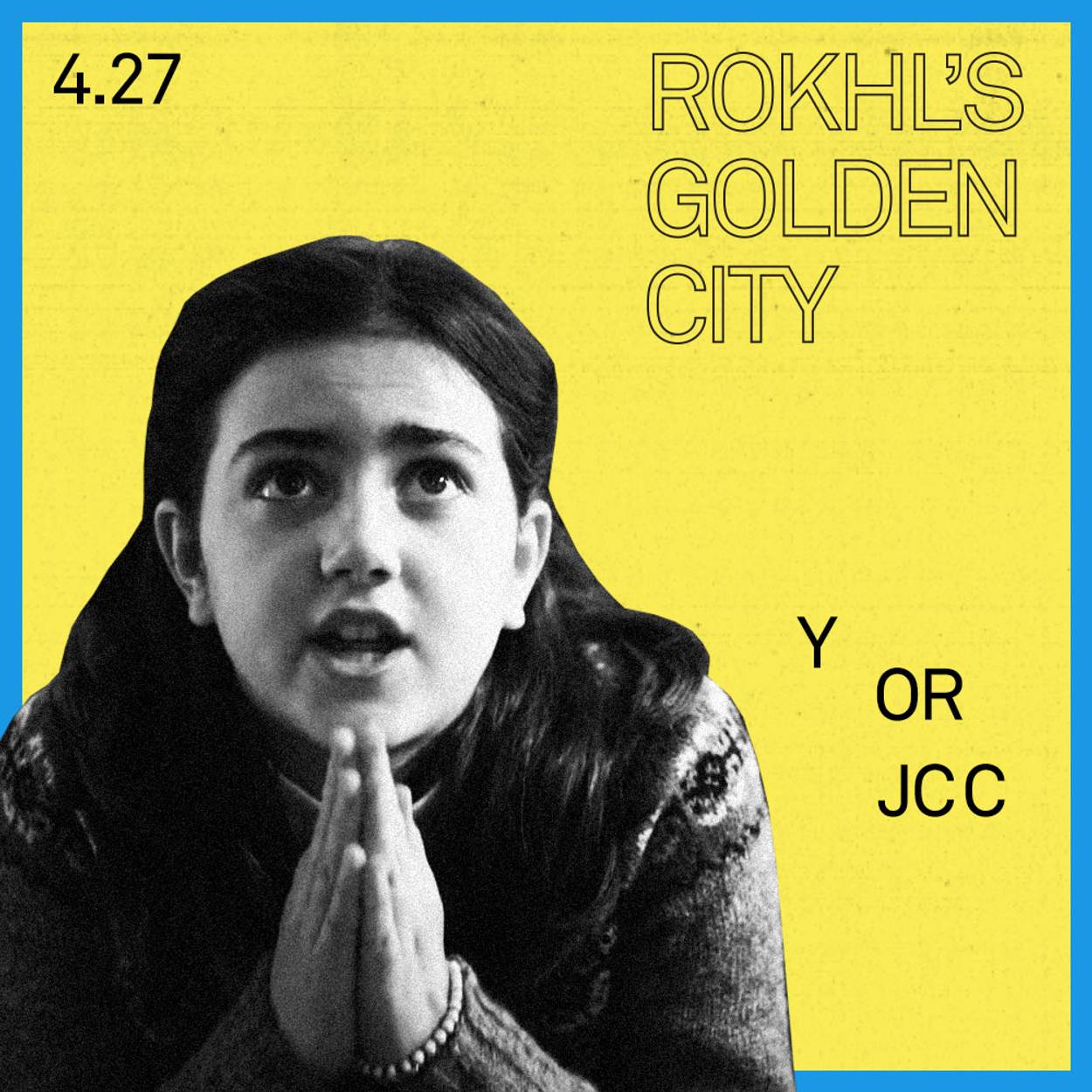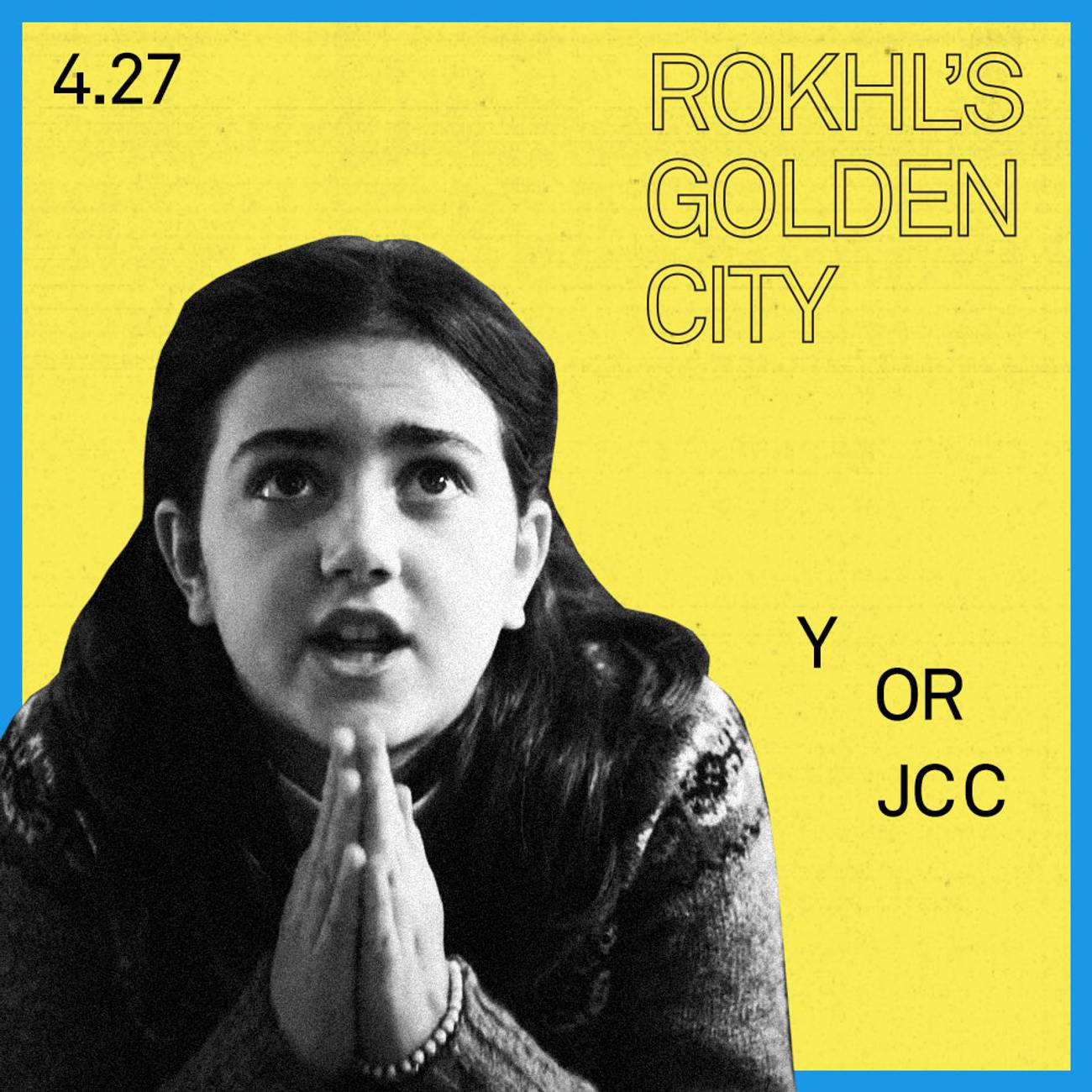Are You There God? It’s Me, Sarah
A Judy Blume movie and a new one-woman show speak to the children of intermarriage




Wanna feel old? If Are You There God? It’s Me, Margaret’s Margaret Simon were a real person, today she’d be old enough to be a grandmother herself. I’m old enough that when I was a kid, the edition I read still had references to belted sanitary napkins. (Are you there God? It’s me, Rokhl, thanking you for continued advancements in menstruation technology.)
Just as interesting as those technological advances is how Are You There God? was ahead of the curve in regards to its focus on intermarriage. According to the 2013 Pew survey data, among Jews who married before 1970—and this would include Margaret’s fictional father—only 17% had a non-Jewish spouse. Today, for couples who married between 2010 and 2020, 61% had a non-Jewish spouse, and that number is much higher if you exclude those who identify as Orthodox, which has a 98% in-marriage rate.
The simple fact of their marriage is enough to strain the relationships Margaret’s mother, Barbara, and father, Herb, have with their own parents. In Herb’s case, that means a move to New Jersey to put more space between themselves and Herb’s overinvolved Jewish mother, Sylvia Simon. Sylvia didn’t necessarily approve of their marriage, but she learned to live with it. Sylvia dotes on her granddaughter and is not the kind to let anything stand between her and an adored grandchild. Barbara’s parents, on the other hand, could not make peace with her choice, resulting in a 14-year estrangement between them. When the Christian grandparents make their abrupt reappearance, religion is still an emotional flashpoint. Instead of accepting Margaret the way she is, they offer to take her to a minister to get things “straightened out.”
This leads to hostilities between Barbara and her parents being renewed, and they depart in anger. Just as they leave, Grandma Sylvia shows up, ready to meet the “enemy” on the battlefield. Rather than running into her arms, however, Margaret is disgusted. As she says, “Sometimes Grandma is almost as bad as everybody else. As long as she loves me and I love her, what difference does religion make?” And it’s true; the religions portrayed in Are You There God? hardly seem different enough, or important enough, to be worth losing your family.
As you have no doubt heard by now, Are You There God? has finally made it to the big screen, opening this week. Excitement and expectations are high, especially among women of a certain age group. Personally, what I’d really love to see is a sequel, one where Margaret goes off to college, maybe to Columbia, or even Brandeis. In the book, religion is a matter of sorting and dividing people: Y or JCC? Bat mitzvah or confirmation? What might happen when Margaret is a little older and starts to think about belonging in a way that goes deeper than the “Y or JCC” divide.
Sarah Sanders’ new, semi-autobiographical one woman show with music, Ashkenazi Seance: A Group Ritual, feels a bit like a spiritual inheritor to Are You There God?’s Margaret Simon. The show takes on questions of identity and belonging, speaking directly to the experience of children of intermarriage and those who fear they’ll never be Jewish enough to please judgmental family members, or ancestors.
After a run at the Brick Theater last year, the show plays for three nights at the end of April at the Union Temple House in Brooklyn. The press materials for the show describe it like this: “Sarah Sanders can’t decide what to do with a treasured family heirloom, and she’s getting desperate—so desperate, she’s turning to her dead Latvian Jewish ancestors for advice.”
The heirloom in question is a spinet piano, previously owned by her father’s mother. The piano has already traveled thousands of miles back and forth across the country, accompanying her parents on multiple moves. And now, her parents are moving yet again, this time to Mexico. If Sarah doesn’t bring the piano back to Brooklyn, they are going to sell it. But dragging a piano all the way from Montana to an apartment in Brooklyn seems more than daunting. What to do? If you’re a multitalented writer-performer like Sanders, you devise a seance ritual and get some help from the other side.
Sanders grew up in Billings, Montana, in the 1990s, a queer, lefty, Jewish kid. As she says in the show, “the places where I felt like I made sense at all were the community theater and the synagogue.” Her parents both embraced leadership roles in the synagogue. But when it came time for her bat mitzvah, her mother was not given an aliyah, as she had not yet converted. Despite feeling deeply Jewish, that connection carries deep scars for Sanders. Her grandmother, the one with the piano, didn’t approve of her parents’ marriage and never bothered to hide her hostility to her new, non-Jewish daughter-in-law.
The piano becomes a focal point for all of Sanders’ questions and self-doubts. It is both a symbol of generations of happy family memories, and an inheritance of exclusion and disapproval. One of the risks of speaking to the dead is not knowing what they will say when summoned. What if we go seeking their approval and they don’t even want to claim us? The seance ritual is an ingenious dramatic device, allowing Sanders to work through her inner fears and contradictions via these channeled voices.
Seances are also incredibly theatrical, allowing a potentially unlimited cast of characters into a one-woman show. At the height of the spiritualist movement, public seances played at theaters, entertaining thousands. As I noted last year, in her memoir, Bessie Thomashefsky describes a seance held backstage at the Yiddish theater. The goal was to ask the spirits who had stolen the box office receipts. Perhaps delighting in the emotional manipulation, Jacob P. Adler, the leader of the seance, closed the ritual by channeling the spirits of the grandmothers of Bessie and another actress.
Special notice should be given to Sofia Geck, composer and performer of the lively music threaded throughout Ashkenazi Seance. The musical highpoint is a truly eerie, and catchy, seance song, with historically informed Yiddish lyrics. My sole criticism of Ashkenazi Seance is that the song’s Yiddish words are mispronounced in a way that will probably baffle Yiddish-speaking audience members, along with a couple other somewhat infelicitous mispronunciations and usages scattered throughout the show. I’m not entirely sure how to feel about that, but perhaps it adds another layer to the theme of identity and heritage: No matter how earnestly we seek to understand, and even dialogue, with our ancestors, our understanding of them, across the greatest distances imaginable, can only ever be imperfect.
Another new project recently came across my desk, channeling American Jewish identity, not through a planchette or seance table, but the old-fashioned way, through instruments. In Der Heym/Down Home is a collaboration between two outstanding musicians on the contemporary klezmer scene who also happen to be friends of mine: Michael Alpert and Craig Judelman. Their sound is warm and laid-back, blending fiddle, guitar, and voice. The repertoire on the album mixes traditional Jewish tunes collected by Moyshe Beregovski, American and Celtic old-time music, and original compositions. They’re calling this new genre “Where Carpathia Meets Appalachia” and that is, indeed, a perfect encapsulation of the joy awaiting you on its tracks.
The album is a serendipitous byproduct of the pandemic. Judelman was staying at Alpert’s home in Scotland when a brief stay turned indefinite in March 2020. Naturally, jamming ensued. As in Ashkenazi Seance, the multimigratory nature of modern Jewish life is an important theme on In Der Heym. Alpert’s song “Heron on the Wing,” over 40 years in the making, is a tribute to his father, alternating verses in the languages they shared (Yiddish, Russian, English) and woven with images of forest and seaside:
My father was an immigrant from far across the sea
He came from a world away to end his journey here
At the edge of a field by a line of maple trees
glowing red and yellow in the autumn of the year
The album makes perfect sense as a coming together of two musicians deeply rooted in their traditions. Klez-fusion projects, especially high concept ones, are vulnerable to a certain clunkiness or heavy-handedness in their execution. In Der Heym wears its genre fusion lightly, seamlessly, perfectly at home in itself.
Fiddle player Craig Judelman summed up the project aptly, saying: “Playing Ashkenazi music has often been a way to connect to an identity that isn’t based in America and its consumerist, homogenizing values—seeking an otherness as an alternative to the de-Yiddishized identity of the Israel-centric modern American Jewish experience. This album proudly marries both aspects of ourselves, engaging with our traditions as a way of embracing rather than escaping our current reality.”
SEE: Ashkenazi Seance: A Group Ritual at Union Temple House of CBE, 17 Eastern Parkway, Brooklyn. Presented by The Neighborhood: An Urban Center for Jewish Life and Brooklyn Jews. April 27, 28, and 29. Purchase tickets here … Buy Michael Alpert and Craig Judelman’s In Der Heym/Down Home on Bandcamp.
ALSO: On April 30, Temple Israel of Boston will present Frauenstimmen: Women’s Voices from the Ravensbruck Concentration Camp, a musical cabaret. The performance will be followed by a discussion with the creators and performers. More information and RSVP here … Moshe Yassur is a living legend. He is the last member alive of the famous “Pomul Verde” Yiddish theater company of Iași (Romania) and he has remained a prolific theater artist in the ensuing decades, including directing the premiere of the Yiddish Waiting for Godot. Join his friends and colleagues for a “Romanian-American Theatrical Journey” in his honor. May 4 at the Romanian Cultural Institute, 200 East 38th St. More information and RSVP here … If you’re lucky enough to be in Berlin, Shtetl Berlin is holding its Yiddish Culture Festival, with jams, dance, concerts, workshops, and lots more. May 4-7, Berlin, Germany. All information here … The fabulous Russian-Yiddish rock-punk band Golem will be joining the Conspiracy of Beards: A Midnight Choir Sings Leonard Cohen for one night. I’m not entirely sure what that will sound like, but I definitely want to find out. May 6, Chelsea Music Hall, 407 West 15th St. Tickets here … The Koschitzky Centre for Jewish Studies at York University (Toronto) will present “The Rediscovery of Yiddish Women Writers,” Found Treasures editor Frieda Forman in conversation with translator Vivian Felsen. May 7. Register here.
Rokhl Kafrissen is a New York-based cultural critic and playwright.